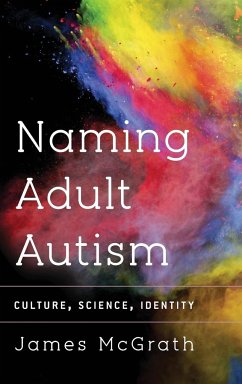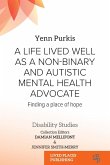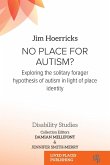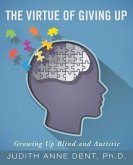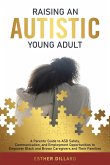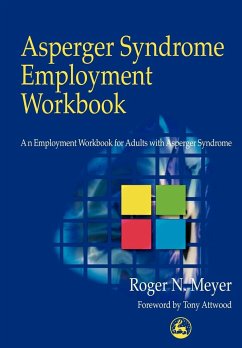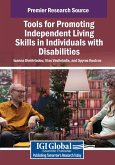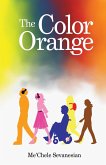- Gebundenes Buch
- Merkliste
- Auf die Merkliste
- Bewerten Bewerten
- Teilen
- Produkt teilen
- Produkterinnerung
- Produkterinnerung
Explores representations of ‘high-functioning’ adult autism in autobiographical, scientific and fictional texts to demonstrate the value of Cultural Studies towards understanding autism as a subjective condition and social category.
Andere Kunden interessierten sich auch für
![A Life Lived Well as a Non-binary and Autistic Mental Health Advocate A Life Lived Well as a Non-binary and Autistic Mental Health Advocate]() Yenn PurkisA Life Lived Well as a Non-binary and Autistic Mental Health Advocate27,99 €
Yenn PurkisA Life Lived Well as a Non-binary and Autistic Mental Health Advocate27,99 €![No Place for Autism? No Place for Autism?]() Jaime HoerricksNo Place for Autism?27,99 €
Jaime HoerricksNo Place for Autism?27,99 €![The Virtue of Giving Up The Virtue of Giving Up]() Judith Anne DentThe Virtue of Giving Up15,99 €
Judith Anne DentThe Virtue of Giving Up15,99 €![Raising an Autistic Young Adult Raising an Autistic Young Adult]() Esther DillardRaising an Autistic Young Adult17,99 €
Esther DillardRaising an Autistic Young Adult17,99 €![Asperger Syndrome Employment Workbook Asperger Syndrome Employment Workbook]() Roger N. MeyerAsperger Syndrome Employment Workbook40,99 €
Roger N. MeyerAsperger Syndrome Employment Workbook40,99 €![Tools for Promoting Independent Living Skills in Individuals with Disabilities Tools for Promoting Independent Living Skills in Individuals with Disabilities]() Tools for Promoting Independent Living Skills in Individuals with Disabilities150,99 €
Tools for Promoting Independent Living Skills in Individuals with Disabilities150,99 €![The Color Orange The Color Orange]() Me'Chele SevanesianThe Color Orange13,99 €
Me'Chele SevanesianThe Color Orange13,99 €-
-
-
Explores representations of ‘high-functioning’ adult autism in autobiographical, scientific and fictional texts to demonstrate the value of Cultural Studies towards understanding autism as a subjective condition and social category.
Produktdetails
- Produktdetails
- Verlag: Rowman & Littlefield Publishers
- Seitenzahl: 272
- Erscheinungstermin: 15. August 2017
- Englisch
- Abmessung: 235mm x 157mm x 21mm
- Gewicht: 596g
- ISBN-13: 9781783480401
- ISBN-10: 1783480408
- Artikelnr.: 42812255
- Herstellerkennzeichnung
- Libri GmbH
- Europaallee 1
- 36244 Bad Hersfeld
- gpsr@libri.de
- Verlag: Rowman & Littlefield Publishers
- Seitenzahl: 272
- Erscheinungstermin: 15. August 2017
- Englisch
- Abmessung: 235mm x 157mm x 21mm
- Gewicht: 596g
- ISBN-13: 9781783480401
- ISBN-10: 1783480408
- Artikelnr.: 42812255
- Herstellerkennzeichnung
- Libri GmbH
- Europaallee 1
- 36244 Bad Hersfeld
- gpsr@libri.de
I would consider myself to have led a life mapped out with an inevitable outcome of disappointment and failure, that although having the dreams and aspirations of any individual starting off in life. My path was seemingly written on the adoption of my surname, as it had been by my mother on the day that she married my father. My childhood would have been my honeymoon period of a rosy view of possibilities in life, that would have reflected the joy and love that had been bestowed upon myself and my siblings within a loving home, headed by two parents that dedicated their very existence to the children that they created, Demonstrated by the sacrifice that they made in the pursuit of the happiness of each and every one of them, whilst being rewarded with nothing but sorrow and pain. This vision of a future that had been an idealistic road map to be repeated by myself, of happiness in a replication of what I had experienced as normality during my upbringing. Being married and being a parent, comparable to what I and my siblings took as what every home experienced very naively as standard procedure up and down the land, but was never to be, as life's rug was slowly pulled from underneath my feet, partly my own blame, but also by the cards dealt to me in life, in my fickle expectations of repeating my upbringing in a stable relationship of the past that no longer exists, to be experienced by my own children, only to find 'commitment' as being a word forgotten. The pain of rejection from the investments made without return upon relationship failures, only removes any further ability to improve life's outcomes. This has brought only pessimism and mistrust that led to a spiral of drug abuse and depression, and has brought me to this point in my life. I still hold on to the humour gifted to us by our parents that we all share and still binds us, and helps us to continue with whatever this existence throws at us next. But I shall march on and attempt to improve, and to be a parent and grandparent one day, hopefully to be dealt an ace from the pack and no longer the joker.
Introduction
1. Outsider Science and Literary Exclusion: A Reply to Denials of Autistic Imagination: Childhood Autism and the Psychiatric Imagination
Autism and the Machine
Computer Coding and
as Literature: Douglas Coupland's Microserfs
Margaret Atwood's Oryx and Crake: Autism and Literary Exclusion
Inaccuracies in Baron-Cohen's "Minds Wired for Science" Narrative
Bias in the Adult Autism-Spectrum Quotient Test (2001)
Re-membering Autistic Imagination: Asperger, Wing, and Harro L.
Silberman's Neurotribes: Science, Science Fiction and Autism
Autistic Responses to Atwood's Oryx and Crake
The SySTEMizing Focus and its Implications for Autistic Diversity
2. Metaphors and Mirrors: The Otherness of Adult Autism
Picking Up The Mirror: Enfreaking Normalcy
Infantilizing Adult Autism in Diagnostic Observations
Autism and Disorder: Foucault, Confinement and Cultural Fear
The Screen as Mirror: The Office (UK) and the Neurotypical Gaze
Post-Curious: Adult Autism as Cultural Spectacle in Big Bang Theory and
1. Outsider Science and Literary Exclusion: A Reply to Denials of Autistic Imagination: Childhood Autism and the Psychiatric Imagination
Autism and the Machine
Computer Coding and
as Literature: Douglas Coupland's Microserfs
Margaret Atwood's Oryx and Crake: Autism and Literary Exclusion
Inaccuracies in Baron-Cohen's "Minds Wired for Science" Narrative
Bias in the Adult Autism-Spectrum Quotient Test (2001)
Re-membering Autistic Imagination: Asperger, Wing, and Harro L.
Silberman's Neurotribes: Science, Science Fiction and Autism
Autistic Responses to Atwood's Oryx and Crake
The SySTEMizing Focus and its Implications for Autistic Diversity
2. Metaphors and Mirrors: The Otherness of Adult Autism
Picking Up The Mirror: Enfreaking Normalcy
Infantilizing Adult Autism in Diagnostic Observations
Autism and Disorder: Foucault, Confinement and Cultural Fear
The Screen as Mirror: The Office (UK) and the Neurotypical Gaze
Post-Curious: Adult Autism as Cultural Spectacle in Big Bang Theory and
Introduction
1. Outsider Science and Literary Exclusion: A Reply to Denials of Autistic Imagination: Childhood Autism and the Psychiatric Imagination
Autism and the Machine
Computer Coding and
as Literature: Douglas Coupland's Microserfs
Margaret Atwood's Oryx and Crake: Autism and Literary Exclusion
Inaccuracies in Baron-Cohen's "Minds Wired for Science" Narrative
Bias in the Adult Autism-Spectrum Quotient Test (2001)
Re-membering Autistic Imagination: Asperger, Wing, and Harro L.
Silberman's Neurotribes: Science, Science Fiction and Autism
Autistic Responses to Atwood's Oryx and Crake
The SySTEMizing Focus and its Implications for Autistic Diversity
2. Metaphors and Mirrors: The Otherness of Adult Autism
Picking Up The Mirror: Enfreaking Normalcy
Infantilizing Adult Autism in Diagnostic Observations
Autism and Disorder: Foucault, Confinement and Cultural Fear
The Screen as Mirror: The Office (UK) and the Neurotypical Gaze
Post-Curious: Adult Autism as Cultural Spectacle in Big Bang Theory and
1. Outsider Science and Literary Exclusion: A Reply to Denials of Autistic Imagination: Childhood Autism and the Psychiatric Imagination
Autism and the Machine
Computer Coding and
as Literature: Douglas Coupland's Microserfs
Margaret Atwood's Oryx and Crake: Autism and Literary Exclusion
Inaccuracies in Baron-Cohen's "Minds Wired for Science" Narrative
Bias in the Adult Autism-Spectrum Quotient Test (2001)
Re-membering Autistic Imagination: Asperger, Wing, and Harro L.
Silberman's Neurotribes: Science, Science Fiction and Autism
Autistic Responses to Atwood's Oryx and Crake
The SySTEMizing Focus and its Implications for Autistic Diversity
2. Metaphors and Mirrors: The Otherness of Adult Autism
Picking Up The Mirror: Enfreaking Normalcy
Infantilizing Adult Autism in Diagnostic Observations
Autism and Disorder: Foucault, Confinement and Cultural Fear
The Screen as Mirror: The Office (UK) and the Neurotypical Gaze
Post-Curious: Adult Autism as Cultural Spectacle in Big Bang Theory and

